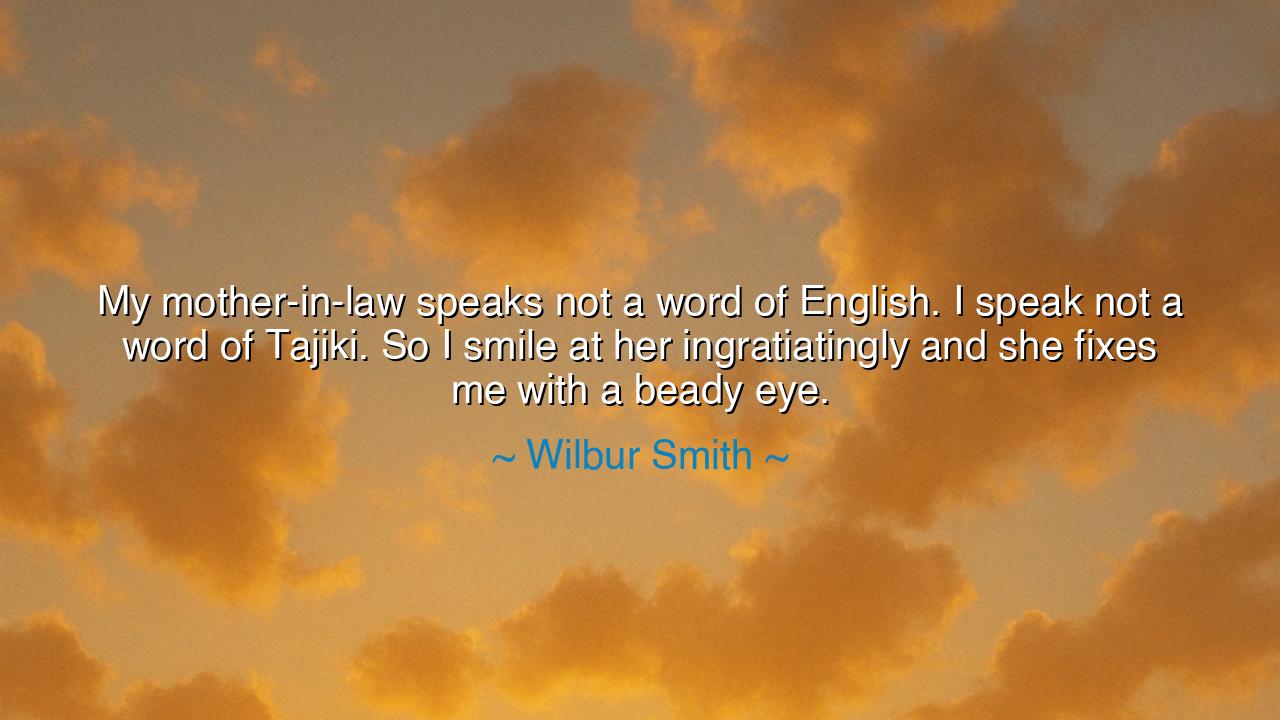
My mother-in-law speaks not a word of English. I speak not a word
My mother-in-law speaks not a word of English. I speak not a word of Tajiki. So I smile at her ingratiatingly and she fixes me with a beady eye.






Hear the words of Wilbur Smith: “My mother-in-law speaks not a word of English. I speak not a word of Tajiki. So I smile at her ingratiatingly and she fixes me with a beady eye.” At first glance, these words seem like a moment of comedy, a clash of cultures reduced to silence, a bridge of family met with suspicion. Yet beneath the humor lies a deeper truth about human connection, about the limits of language, and about the power—and the inadequacy—of the smile when words fail.
The ancients knew well that the barriers of language often stand as walls between peoples. Herodotus, the historian, wrote of encounters between tribes who could not understand one another’s speech, relying on gestures, signs, and expressions to bargain or to plead. Here, too, Smith stands in that ancient lineage: two souls bound by family, yet separated by speech, forced to rely upon the universality of the smile. But the beady eye of the mother-in-law reveals another truth—that a gesture meant as peace can be met with suspicion, for sincerity is not always clear when words are absent.
Consider the tale of Pocahontas and the English at Jamestown. When language divided the newcomers and the Powhatan people, the smallest gestures became fraught with meaning. A smile, a gift, or even silence could determine whether the moment became one of peace or one of conflict. Smith’s anecdote is lighter, yes, but it resonates with the same reality: that without words, intentions are easily misunderstood, and what is meant as goodwill may be read as presumption or weakness.
The smile, in its essence, is humanity’s oldest language. It speaks of peace, of friendliness, of a wish to connect. But like all symbols, it is interpreted through the eyes of the other. Smith’s ingratiating smile is not enough to bridge the gulf; instead, it is met with the sharp gaze of judgment. The mother-in-law, with her beady eye, asserts her power in silence, reminding us that relationships are never defined only by gestures, but by the unspoken currents of respect, trust, and understanding that must be built over time.
Yet within this story lies a heroic truth: that even when speech fails, the attempt to connect remains noble. The smile may not have won the mother-in-law’s approval, but it revealed the son-in-law’s willingness to humble himself, to attempt peace, to try even in awkwardness. And in that humility, there is strength. For those who try, even in clumsiness, are greater than those who do not try at all.
The lesson for us, then, is this: when words fail—whether through the gulf of language, culture, or difference—do not retreat into silence or pride. Offer the smile, the gesture, the attempt. Know that it may not always be received as you hope, but that effort itself is the seed of understanding. And with patience, what begins with suspicion may grow into acceptance, and what begins with awkwardness may one day blossom into trust.
So let this wisdom endure: language may divide us, but the human spirit longs to connect. Even the smile, though imperfect, is a bridge across the abyss. Do not be disheartened if the first glance you receive is wary or sharp; for trust is not built in a moment, but over time. Continue to show goodwill, continue to reach across the silence, and eventually, the gulf will narrow. For even the hardest beady eye may one day soften in the presence of steadfast kindness.






AAdministratorAdministrator
Welcome, honored guests. Please leave a comment, we will respond soon